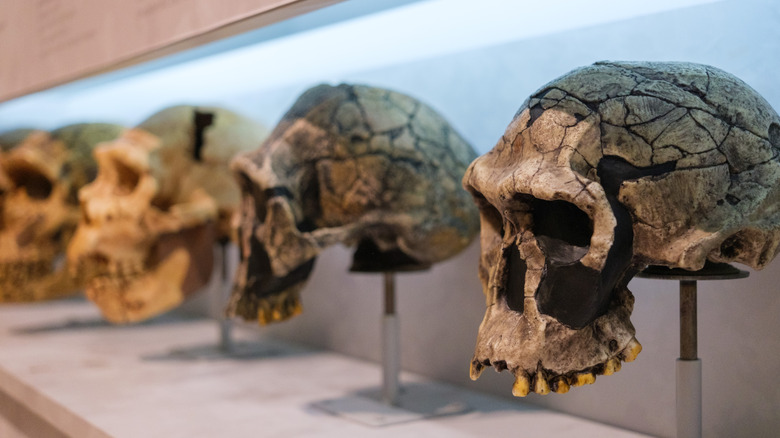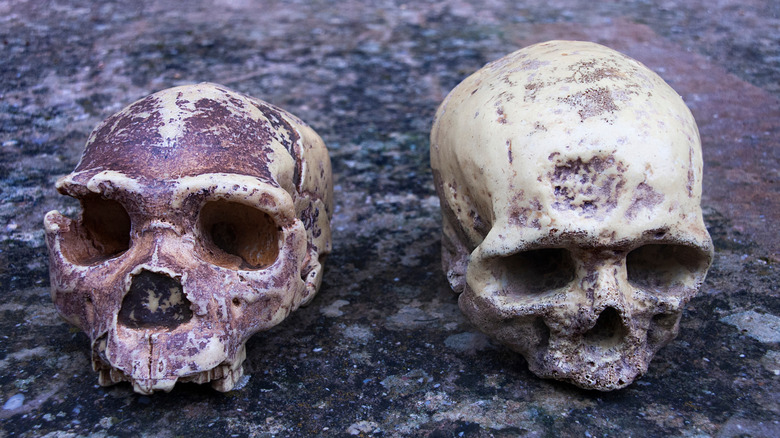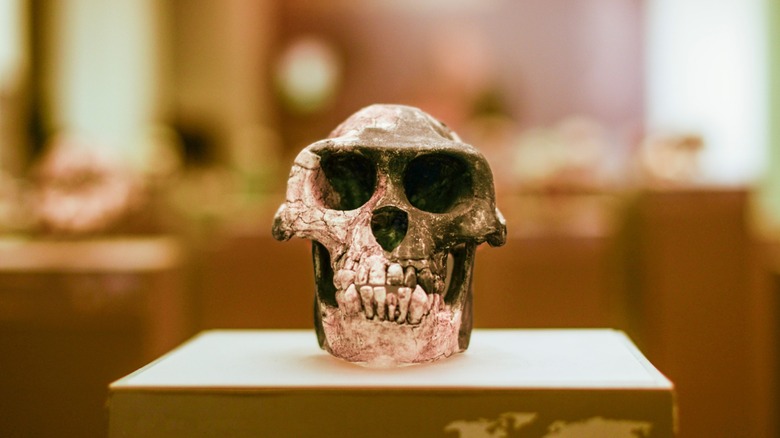We Could Be Totally Wrong About The Origins Of Humans
Based on the timeline, stages, theories, and evidence of human evolution, the science community generally accepts that the ancestors of Homo sapiens originated in Africa and eventually migrated north into Europe and east into Asia. Some scientists, however, theorize that the ancestors of modern humans actually originated in Europe and the eastern Mediterranean, and a team of researchers from Canada, the Netherlands, and Türkiye have brought forth evidence to support this theory.
Led by professor Ayla Sevim Erol from Ankara University in Türkiye and professor David Begun from the University of Toronto in Canada, the team of anthropologists and other scientists discovered a partial cranium fossil in an 8.7-million-year-old site near Çankırı, a city in north-central Türkiye, in 2015. The fossil included the front of the brain case (more than previous fossils) and most of the facial structure, allowing the researchers to do a broad, detailed analysis and apply mirror imaging. From those details, they identified the remains as a new ape species now named Anadoluvius turkae which lived in a dry, open forest environment and was about the size of a large male chimpanzee or average female gorilla.
The findings were published in Communications Biology in August 2023 and demonstrated that Mediterranean fossil apes like this one are part of the first branch of early hominines (the subfamily Homininae, of which hominins are a tribe), which includes bonobos, chimpanzees, gorillas, and humans. In a statement, Begun said "Our findings further suggest that hominines not only evolved in western and central Europe but spent over five million years evolving there and spreading to the eastern Mediterranean before eventually dispersing into Africa, probably as a consequence of changing environments and diminishing forests."
Why the analysis points to Europe as the origin of humans
There's more to the theory that humans originated in Europe than just the location where this cranium fossil of Anadoluvius was discovered. It's the most well-preserved specimen among a group of others — Graecopithecus from Bulgaria and Ouranopithecus from Greece — which have the closest similarities to the earliest known humans in their anatomy and ecology. Because of that, it provides the strongest evidence so far that Europe was the origin of this group.
With their analysis, researchers also concluded that apes from the Balkans and Anatolia (the peninsula of modern-day Türkiye where an underground city was discovered in an unlikely place) evolved from ancestors that lived on the central and western parts of Europe. Additionally, it provides evidence that other apes were more likely to have originated in Europe and eventually diversified into Africa, rather than the other way around. In fact, African apes (chimpanzees, bonobos, and gorillas) are only known to be from Africa (as was at least one bizarre species of human that went extinct: Homo naledi).
According to Begun's statement, "While the remains of early hominines are abundant in Europe and Anatolia, they are completely absent from Africa until the first hominin appeared there about seven million years ago. This new evidence supports the hypothesis that hominines originated in Europe and dispersed into Africa along with many other mammals between nine and seven million years ago, though it does not definitively prove it. For that, we need to find more fossils from Europe and Africa between eight and seven million years old to establish a definitive connection between the two groups."
Other studies support the Europe origin story of humans
The discovery of Anadoluvius isn't the first one that has led researchers to believe that human ancestors originally evolved in Europe. In 1989, cranial fragments of Ouranopithecus macedoniensis were found in northern Greece and dated to be from the late Miocene, which occurred between 11.6 and 5.3 million years ago. More specimens from this species estimated to be even older than the late Miocene were found in the same region in 1993, and additional fossils dating from the same period have been found in Greece over the last two decades.
In 2017, scientists published a couple of studies of Graecopithecus fossil specimens that concluded this species lived in Greece and Bulgaria, where the fossils were found, hundreds of thousands of years before the first potential human ancestors lived in Africa. The researchers noted that their analysis demonstrates Europe is just as likely to be the origin place of human ancestors as Africa. More well-preserved fossils are needed to make a definitive determination.


